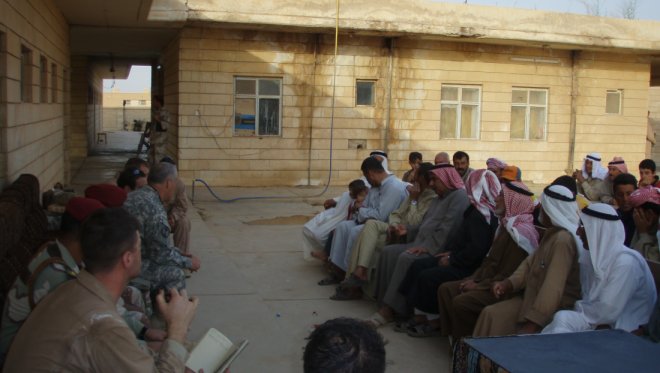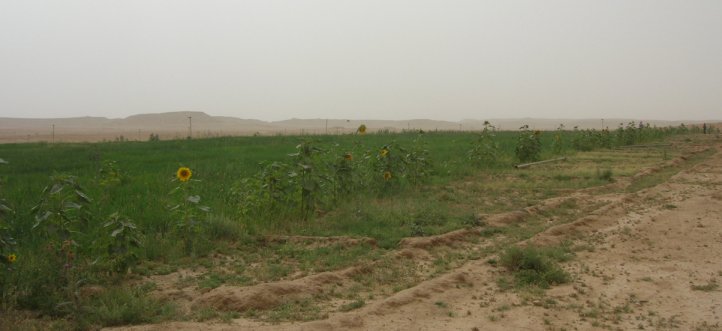Below is our team member Allen Gifford meeting with farmers in the Rawah area north of the Euphrates

Sometimes they expect more than we can give. Usually we can do something.
Our ePRT was part of the diplomatic surge that went in soon after the change in strategy that produced the military surge in early 2007. The initial team was hastily assembled with short term contractors. My predecessor was a senior State Department officer, but he staying in country only six months. The last of the original crew is set to leave in a couple of weeks, which made me think about how much had changed in the last year.
I didn’t get to Iraq until September 2007, so I rely on what others have told me and what I could see when I arrived. It was a lot harder back then, much more constrained and a lot more dangerous. The team could not move as safely as we can now. They could not talk to ordinary Iraqis on the street, as we now can do routinely. They did not have access to the quick reaction funds we now enjoy. In short, their job was to “hold the fort” and prepare the base on which others (i.e. we) could build. I have to give them a lot of credit, as I sit in relative comfort and safety.
It is also easier to work in general. When the ePRT was established it was sort of accreted onto a Marine regiment. Nobody really knew what sort of role the ePRT should play. I think there was a little hostility among the fighting Marines to a group of know-it-all civilians. This was exacerbated by the restrictions in team activities and movement I mentioned above. I felt overwhelmed when I arrived by the uncertainty. How could our ePRT add value? I can only imagine how the first team members must have felt, landing on what was then considered the dark and bloody ground of the Sunni Triangle. What a difference a year makes!
I had a real running start, provided both by the team members that smoothed the way for me and by the foresight of the Marines of RCT5. I did not fully appreciate it at the time, but Colonel Malay sent his executive officer and some of his key officers to the Foreign Service Institute to train with us. This helped them understand us and gave us an insight and relationship into the Marines.
We now enjoy a seamless relationship with the Marines. My office is on the command deck, across for Colonel Malay’s and next door to the executive officer. My team sits with the Marine civil affairs team and it is hard to tell where my team ends and theirs begins. I am very lucky in that my team is largely self managing. We form ad-hoc groups to address particular issues and each team member feels free to call on the help of other team members and Marines who can contribute. The task groups are led by whoever is most appropriate at the time and much of the decision making is collaborative. I think it was Henry Ford who said that asking who should be in charge is like asking who should sing tenor in the choir. I find that works in my group, with particular team members talking the lead when their talents and expertise are foremost. Our team and our groups have fuzzy fringes. It is not clear where our team or the subgroups begin and end. Maybe I violate some management precepts about clear hierarchy, but I figure in a group the size of ours with the necessity to form fuzzy teams with people I do not control, including Marines and our Iraqi friends, there is not much option. It seems to work. We get a lot done and morale is high. I think that is an achievement in an environment as challenging and tough as ours.
That point about not controlling is important. I influence. The authority to write those performance reviews is the source of most power in government bureaucracies. I don’t have that, so I have had to pay more attention to other elements of influence. This job has tested my belief that the boss cannot expect to be GIVEN respect but has the responsibility to earn it. I still believe it, but I appreciate more the other side of that equation – the team. It is much easier to win the respect of those who respect themselves and my team members do.
Of course, things are not always so gloriously uncomplicated. We have our difficult personalities and difficult moments, but I think the challenge of being here and the responsibility of doing something important tends to concentrate people’s minds. Maybe teams like ours run on adrenaline. Maybe that is why people tend not to be able to keep it up too long. Maybe these sorts of teams are not appropriate in the more settled environments where a machine bureaucracy can perform at its best. I don’t know. I have only a few months left here, so I probably will not understand it. The team is so fluid in terms of membership and our tasks are so protean that it is hard to hold it down long enough even to get a good look. It works now and that is good for now. Next month I will figure it out again for then.

Management experts will study PRTs. Some have started already. They may even study ours and our contribution to a better Al Anbar. I think they will determine that the concept worked and that we did what we were supposed to do. We didn’t always go in a straight line, but we helped consolidate success in Iraq. If they are really smart, maybe they will figure out how. I want to read the report.
Above is a field of sunflowers near Rawah. They are better at growing the things than I am.
